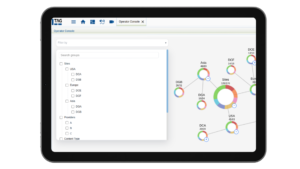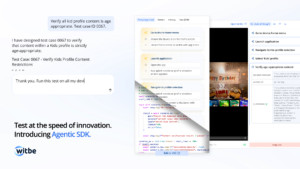Imagine Communications – Bridging the skills gap: addressing the talent shortage in the media and entertainment industry

Dr. Glodina Connan-Lostanlen, Chief Process Officer, Imagine Communications
Recently, rapid technological advancements in the media and entertainment industry have coincided with a generational shift in the workforce. Many seasoned broadcast engineers are retiring or approaching retirement, resulting in the loss of crucial skills that support traditional broadcast systems still in use today. And while younger hires bring important IT, cloud and IP networking expertise to the table, they lack the valuable knowledge of their predecessors in television technology and are not entering the field quickly enough to replace them. This has led to a skills shortage, and in this article, we will explore what the industry is doing — and needs to do — to address it.
Venturing outside traditional talent pools
Broadcast technology companies are increasingly focusing on cloud-based services and software-centric platforms, necessitating a more diverse set of talent requirements. The need to recruit cloud architects and software developers from the IT sector has become crucial. However, today’s competitive landscape means that attracting talent from outside the industry is challenging, particularly with a younger generation that has different expectations. Chief among these is the ability to work flexibly — whether remotely or from an office — and that is now considered one of the top criteria for selecting a job. To remain competitive, broadcast technology companies must offer this flexibility to recruits.
Another key consideration is that recruitment is a lengthy process. Even after a candidate accepts a position, they may change their mind. To avoid gaps or starting the recruitment process from scratch if a preferred candidate falls through, it is vital to build a talent pipeline that can be tapped when needed. The best time to develop this pipeline is well before it becomes necessary.
Retaining talent
After successfully recruiting talent, the next challenge is retention, which demands a multi-faceted approach. Broadcast technology companies must adapt their communication tools to foster a more collaborative environment suitable for remote work. Additionally, they need to rethink how they measure employee performance. Instead of traditional evaluations, companies should adopt more scientific and adaptive metrics that reflect the specific roles and tasks of a diverse workforce.
For the younger generation, context and meaning are also increasingly important. They seek a sense of purpose and connection to their work, making it crucial to help them understand how their efforts contribute to the bigger picture, both within the company and beyond.
However, even with these steps, staff turnover will remain a concern. While broadcast engineers of the past tended to commit long-term to one company, the younger workforce is more inclined to seek new opportunities after a few years. As the industry progresses, it is unlikely that new recruits will remain with a company for decades.
Focusing on training
For recruits entering from outside the industry, the 24/7 broadcasting environment represents a significant shift from their previous experiences, presenting a steep learning curve. For instance, in typical IT support roles, even a critical ticket can wait a few minutes — while in television operations, a few minutes of lost airtime has a significant revenue impact. The situational urgency of managing a live system is itself a skill that needs to be learned.
Ideally, this gap would be addressed at the university level, where talent could acclimate to the broadcast environment before starting their careers. However, for those currently entering the industry, training is the best solution. Fortunately, numerous training resources are available. Organizations like the IABM and AIMS provide various opportunities for sharing and receiving knowledge. Moreover, many of today’s training courses have evolved from a purely engineering focus to accommodate the growing demands of various streaming platforms, broadcast areas, and multiple applications.
Diversity and creating entry-level pathways
Beyond recruiting younger talent, the media and entertainment industry also needs to attract more diverse talent, a necessity it has historically overlooked, especially in technical and engineering roles. Promoting diversity and inclusion not only draws on untapped potential, but also introduces fresh perspectives and voices that can drive the industry’s evolution.
To achieve this diversity, it is crucial to raise awareness of career opportunities within the industry among young people from all backgrounds as early as possible. This involves engaging with students in earlier grades and encouraging them to consider the media and entertainment industry as a viable career path. Additionally, creating entry-level pathways for those who choose this direction is essential.
One example is the T Level in Media, Broadcast, and Production, which will be available in the UK this September. This two-year program is designed for students aged 16-19 and includes a minimum of nine weeks of industry placement, ensuring students gain the experience and expertise needed for a career in the media and entertainment industry.
Networks and other companies within the industry are also joining the effort. For instance, ITV has introduced the ITV Academy, offering production apprenticeships on some of the UK’s biggest shows, work experience opportunities, paid placements, graduate training programs, and more.
Moving forward through collaboration
The skills shortage in the media and entertainment industry is no secret, but traditionally, there has been a lack of a global platform for sharing best practices and solutions to this critical issue. This will change with the World Skills Café at IBC2024. This unique event will serve as a global forum where industry stakeholders can exchange insights, best practices, and strategies to collectively address the skills shortage affecting companies worldwide.
Additionally, 2023 saw the establishment of the Global Media & Entertainment Talent Manifesto, a new membership organization dedicated to tackling the skills shortage by fostering collaboration and sharing knowledge across the industry. These initiatives demonstrate that through collaboration, we can create a more inclusive and skilled workforce capable of meeting the demands of the rapidly evolving media landscape.









